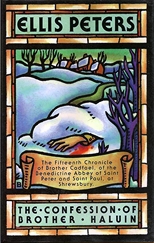Wed 21 Feb 2018
Archived Review: ELLIS PETERS – The Confession of Brother Haluin.
Posted by Steve under Reviews[2] Comments
ELLIS PETERS – The Confession of Brother Haluin. Mysterious Press, hardcover, 1989; paperback reprint, December 1989. First published in the UK by Headline, hardcover, 1988.
The 15th chronicle of Brother Cadfael. The year is 1142, and a winter’s accident nearly takes the life o Brother Haluin, whose sins (he confesses) include an unsanctioned love — and an abortion — and when he survives, his guilt is still very much with him.
As in good science fiction, Ellis Peters has a special knack of sweeping us away to another time and another place with the greatest of ease. This is tasty and moody medieval fiction, taking place when the ways of the world were very different; it is also achingly good, but marred by a flaw that can’t help being noticed.
[WARNING: Plot Alert!]
All but one of the characters in this novel are perfectly realized, but the one who is not has a large role, and she just happens to be the mother of Haluin’s child. As every mystery reader will realize at once, neither the mother nor her daughter died in the attempted abortion, but Haluin does not know this, nor has the possibility ever occurred to him, and he has lived with the guilt for eighteen years.
The mother of the girl he loved has suppressed the truth from everyone all this time, but Haluin’s pilgrimage to the girl’s home begins a chain of events that culminates in the death of an aged servant woman, who also knew the truth. All well and good, but you may find as much problem with this as I did. The girl herself is still alive; she is now in a nunnery; and she also know who and where Haluin has been all this time.
We (the reader) are never permitted to know or see her except from a distance, and so the reason she has not spoken out before now is never explained. It should not have been difficult. All that needed to be pointed out is that “times were different.” Perhaps we are simply to assume that is the case, but why then should it be said of her (p.192) that “… for her there was no guilt, she had done no wrong but in loving [Haluin] …”
Please forgive me, but not so. That was no crime. The crime — perhaps, I admit, from a present day perspective — was in allowing Haluin to live eighteen years in misery, thinking he was responsible for killing the one he loved. Or if this is not the way it was, then the girl’s story should have been told, and it it is not. The size of the hole it produces is not large and depends greatly on your own point of view, I’m sure. To me, however, it was evident enough for me to tell you about it here.
Otherwise? A perfectly told tale.

February 21st, 2018 at 11:38 pm
Impecibly written, as all her works are, but not one of my favorite Cadfael novels. I’m afraid the Felse family, particularly Dominic and his sister remain my favorites.
February 22nd, 2018 at 10:06 pm
I’m going to agree with you about the Felses, David. I don’t quite know how to express it, but I find myself more comfortable hanging around with them than I do with Brother Cadfael.